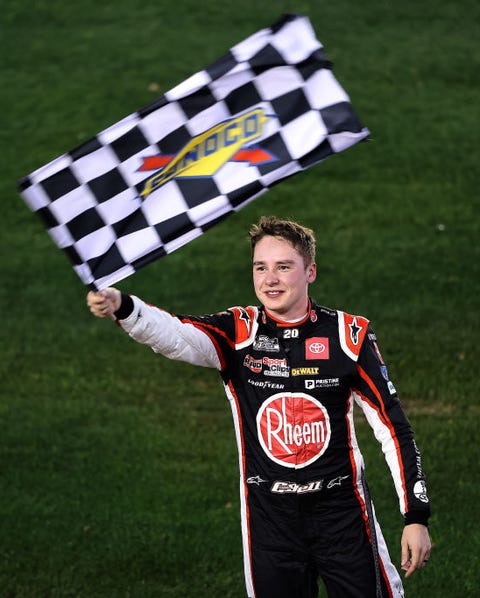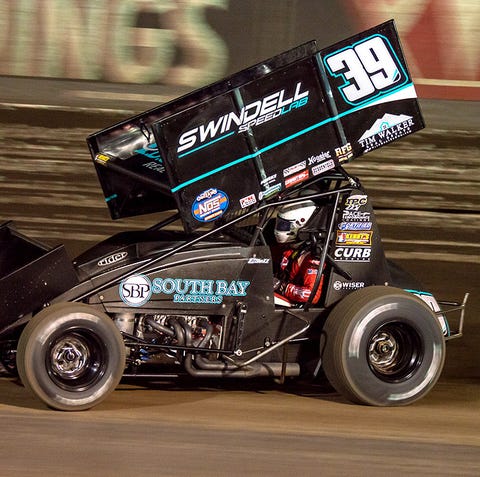The future is now.
The O'Reilly Auto Parts 253 was a display of what the NASCAR Cup Series is poised to become over the next decade -- an increasingly road course centric discipline with occasionally chaotic finishes headlined by young stars like Christopher Bell.
But this surely isn’t how Bell envisioned his first win at the highest level of the discipline, especially back in 2015 when he was first signed to a Toyota driver development contract as a Sprint Car prospect out of Oklahoma who was given a clear pathway up the NASCAR ladder system.
This content is imported from YouTube. You may be able to find the same content in another format, or you may be able to find more information, at their web site.
"Growing up dirt track racing, I didn’t even know what a right-hand corner looked like before I got in the Truck Series," Bell said.
Christopher Bell winning a NASCAR Cup Series race at Daytona International Speedway felt inevitable. Winning one on the Road Course at Daytona was a different matter entirely.
It took Bell awhile to come around to making those right-handers.
As recently as his Xfinity Series tenure, he would speak about his lack of enthusiasm, because it was so different than everything he had done up to that point.
"I didn’t love road course racing at the time," Bell said. "I wasn’t exceptional at it, but I didn’t suck at it. I just didn’t care for it."
But Sunday was a testament to the inherent abilities that encouraged Toyota to sign and develop Bell in the first place. It was the reason Joe Gibbs Racing parted ways with Erik Jones rather than lose Bell to another manufacturer during Silly Season last summer.
Bell is the closest thing to a sure bet there was the driver development game over the past decade and the type of versatility he has shown over the past three years just needed to be cultivated.
In signing Bell, Toyota had always hoped to develop their own modern version of Jeff Gordon and Tony Stewart -- two Sprint Car aces who took very quickly to turning left and right in a Stock Car.
Bell believes there is definitely a crossover between the two disciplines as well.
"I definitely think dirt racing is very beneficial for road racing," Bell said. "Whenever you go road racing, you’re always kind of at the limit of the car. You’re sliding around, you’re slipping. It’s all about getting the most out of your equipment in every corner.
"I think dirt racing teaches you the car control of how to pick up little bits of speed here and there, just being unorthodox about it in some places. I enjoy it. I definitely think dirt racing gives you the skill set needed to be a good road racer."
Seven Truck Series wins, 16 Xfinity Series victories, and one at the Cup level on a road course later, it appears as if everything is going according to plan.
It took Bell just two races to win in the No. 20. This was validation after a challenging rookie season driving satellite Gibbs equipment at Leavine Family Racing. It was the first time in years Bell hadn’t won in anything -- NASCAR or dirt.
A reduced schedule due to the pandemic certainly didn’t help.
But Bell called Sunday "the happiest moment I’ve had in a long time," breaking the first real slump of his already decorated career.
"That’s obviously up against the Cup guys and on the dirt side, too," Bell said. "2020 was a really, really low point for me.
"To be able to come back in ’21 and win in the Cup Series this early on a road course is something that I’m going to cherish for the rest of my life. I just can’t wait to see what we can do on the ovals and build on this."
Meanwhile, NASCAR completed its first road course weekend of the season, the first of seven on the Cup Series schedule this season.
It’s no secret that the Next-Gen car is being developed around concepts borrowed from both IMSA and Australian Supercars.
Sunday was a preview of things to come. The O'Reilly Auto Parts 253 was the genesis of a NASCAR that rewards turning left and right, occasionally on dirt, and always under the threat that an ill-timed caution that could turn the running order upside down.
That’s what happened on Sunday.
This content is imported from YouTube. You may be able to find the same content in another format, or you may be able to find more information, at their web site.
Chase Elliott had won the previous five races held on road courses over the past two seasons across Watkins Glen, the Charlotte Roval and Daytona. He led 44 of the first 57 laps and was driving away until a caution with 13 to go flipped the running order.
The caution was for dubious reasons, the lightest of rain on a road course where rain tires were available, but NASCAR regulations require at least one caution to allow teams an equal opportunity to switch over.
That runs contrary to traditional road course officiating where the decision when and if to swap over is optional.
The mandated caution -- which didn’t even result in a single team choosing rain tires and did not require wipers or the blinking red rain lights -- changed the outcome of the race.
In real time, Kyle Busch called it the "show caution" over his team's radio communications. When told NASCAR reported rain in oval Turn 2, Elliott laughed and told his spotter it wasn't.
This content is imported from Twitter. You may be able to find the same content in another format, or you may be able to find more information, at their web site.
"When you have the late race cautions like that, you have a mixed bag of who stays (out) and who goes (to pit road) and it’s a bit of a gamble," Elliott said. "I thought tires were the right move and tires won the race so I think it was the right move.
"But once you get back in traffic, it’s just so chaotic, and who gets through, and who doesn’t determines how it shakes out."
Elliott landed on one end of the spectrum and Bell on the other -- even if they both agreed about the dynamics of the late caution on a road course.
"I enjoy road racing because I think it’s very difficult," Bell said. "Racing the racetrack, producing lap time, seeing who’s fast at it, is very rewarding. It’s real, right? If you go out there and run well at a road course, that’s real.
"On the flip side, whenever you get restarts, everyone is boxed up, just running into each other, that’s the side of road course racing I don’t love. Being at the mercy of everyone else, it gets a little bit superspeedwayish on the restarts. …
"I just hate it’s so easy to get caught up in other people’s mess. It’s so easy for guys to poke you, spin you out. It’s a love-hate relationship for me."
At least on Sunday, Bell had every reason to love it.
NASCAR had every reason to love it too. This was their vision of the future manifest.
This content is created and maintained by a third party, and imported onto this page to help users provide their email addresses. You may be able to find more information about this and similar content at piano.io
"come" - Google News
February 22, 2021 at 09:54AM
https://ift.tt/3dzbism
NASCAR's Daytona Road Race Was a Sign of All Things to Come - Autoweek
"come" - Google News
https://ift.tt/2S8UtrZ
Shoes Man Tutorial
Pos News Update
Meme Update
Korean Entertainment News
Japan News Update
Bagikan Berita Ini
















0 Response to "NASCAR's Daytona Road Race Was a Sign of All Things to Come - Autoweek"
Post a Comment